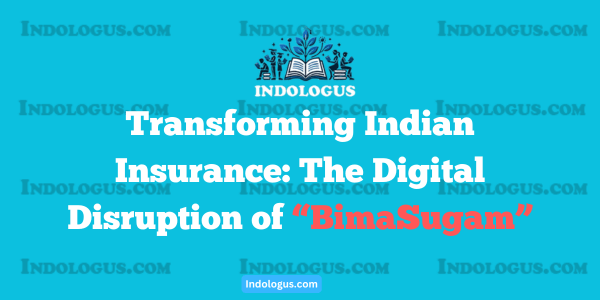The Indian insurance sector, a critical pillar of the nation’s financial ecosystem, is poised for a significant transformation with the upcoming launch of BimaSugam, a digital platform conceptualized by the Insurance Regulatory and Development Authority of India (IRDAI). Drawing parallels to the transformative impact of the Unified Payments Interface (UPI) on digital banking, BimaSugam is envisioned as a game-changer in the insurance industry, aiming to make insurance more accessible, affordable, and customer-friendly.
What is BimaSugam?
BimaSugam is a pioneering e-commerce platform designed to simplify the insurance lifecycle, from policy acquisition to claims settlement and renewals. By integrating all stakeholders—insurance providers, intermediaries, and customers—onto a unified digital platform, BimaSugam seeks to eliminate inefficiencies, reduce paperwork, and foster transparency.
Key Features of BimaSugam:
- One-Stop Destination: Centralized access for purchasing, renewing, and porting policies, including life, health, motor, and travel insurance.
- Direct Purchases: Customers can buy policies directly from insurance companies, brokers, or agents.
- Centralized Data Repository: Enables seamless policy comparison, portability, and monitoring.
- Cost Efficiency: Reduced intermediary commissions make policies more affordable.
- Real-Time Data Access: Offers validated data for better policy management and faster claim settlements.
- Reduced Paperwork: Simplifies the entire process, saving time for customers.
- Ownership and Collaboration: Shared ownership among life and general insurance companies, brokers, and agent bodies ensures broad industry support.
The Vision Behind BimaSugam
- Accessibility: Make insurance accessible to underserved segments, especially in rural areas.
- Transparency: Foster trust through simplified processes and transparent operations.
- Growth of Insurance Density and Penetration: Address India’s low insurance penetration (4.2% of GDP) and density ($91 per capita), which lag behind global benchmarks.
Challenges in Implementation
Despite its ambitious vision, BimaSugam faces several challenges:
- Regulatory Compliance: Adapting to dynamic insurance regulations.
- Data Security: Ensuring privacy and protection of sensitive customer information.
- Technology Infrastructure: Building a reliable, glitch-free platform with disaster recovery systems.
- User Adoption: Encouraging customers to embrace digital insurance processes.
- Operational Complexity: Aligning diverse stakeholders and interests within the insurance ecosystem.
Social, Economic, and Political Impacts
Social Impact
- Financial Inclusion: Simplified processes will enable more individuals, especially in rural areas, to access insurance.
- Awareness and Education: Promotes insurance literacy as an integral part of financial planning.
Economic Impact
- Job Creation: Boosts employment in insurance sales, distribution, and technology support.
- Economic Resilience: Insurance reduces vulnerability to financial shocks, fostering a stable economy.
Political Impact
- Government Policies: Aligns with India’s agenda for financial inclusion and social security.
- Regulatory Evolution: Sets a precedent for innovation-driven policy frameworks.
Potential Benefits of BimaSugam
- Streamlined processes reduce the time and complexity involved in buying and managing insurance.
- Cost efficiency makes insurance more affordable for the masses.
- Transparency builds trust and encourages more people to adopt insurance.
- Integration with other digital initiatives fosters a unified financial ecosystem.
Conclusion
BimaSugam represents a transformative leap in India’s insurance industry, akin to UPI’s impact on banking. By addressing core challenges of accessibility, affordability, and efficiency, it has the potential to bridge critical gaps in insurance penetration and density, especially in rural areas.
The platform is not just an innovation but a step towards creating a more inclusive, customer-centric, and robust insurance ecosystem. While challenges remain, strategic planning, technological investments, and stakeholder collaboration will be pivotal in ensuring BimaSugam’s success. Its impact on India’s financial resilience and social security will mark a milestone in the journey towards a more equitable and empowered society.



